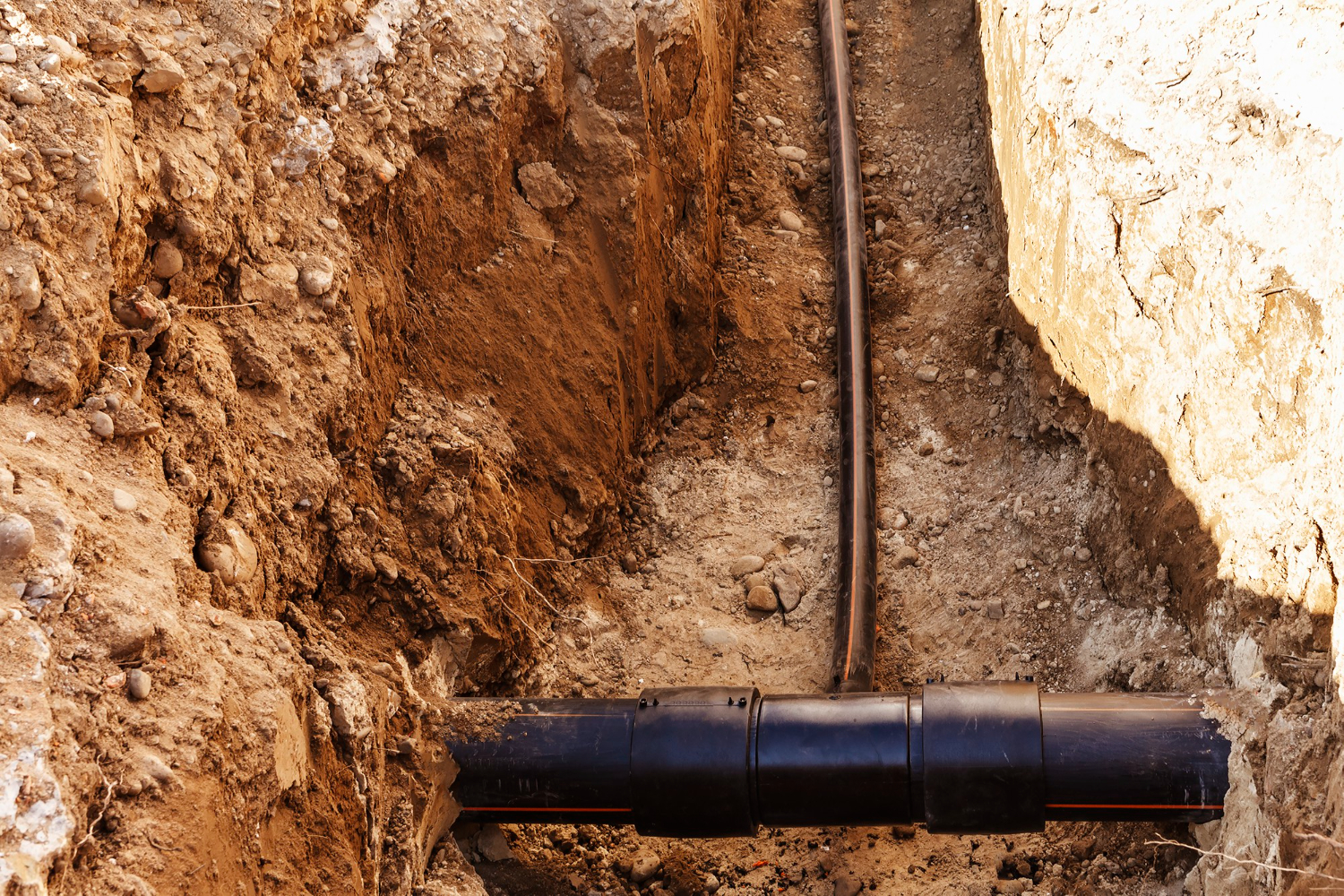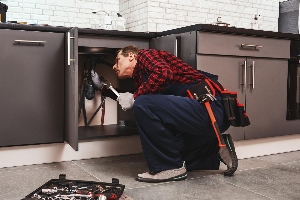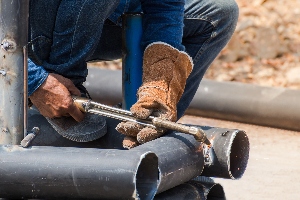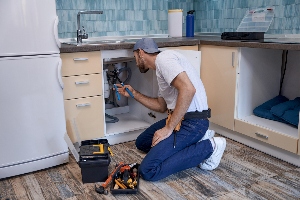Water leak underground can cause serious damage to your home and yard if left undetected. These hidden problems often start small but quickly lead to expensive repairs and wasted water.
A typical household leak can waste nearly 10,000 gallons of water per year, and underground leaks are among the most destructive because they can undermine your home's foundation.
The stakes are high: nearly 140 million Americans rely on groundwater from major aquifers for drinking water, according to the USGS. Even small leaks have the potential to compromise water quality if left unaddressed.
We often notice these leaks only after significant damage has occurred. Unusually green or lush patches in your lawn, sudden increases in your water bill, or damp spots in your yard can all indicate water escaping from pipes beneath your property.
These warning signs shouldn't be ignored, as early detection can save you thousands in repair costs.The good news is that homeowners can learn to spot these warning signs before a minor leak becomes a major disaster.
In this article, we'll show you the key indicators of underground water leaks and explain what steps you should take when you discover one.
Through the topics below, you’ll learn how to recognize the signs, what causes hidden leaks, and how detection works:
- What causes underground water leaks in South Carolina homes?
- Warning signs every homeowner should watch for
- What to do if you suspect a water leak underground
- Fast and accurate underground leak detection in Columbia & Greenville
Keep reading to learn how to identify a water leak underground before it damages your yard or foundation.
What causes underground water leaks in South Carolina homes?
South Carolina homes face several unique challenges that can lead to underground water leaks. These hidden problems often develop slowly over time due to environmental factors and infrastructure issues specific to our region.
Shifting soil and aging pipe materials
The varied soil composition across South Carolina creates significant challenges for underground pipes. Our coastal regions have sandy soil that shifts easily, while the Midlands and Upstate areas contain more clay and rock. These soil differences cause ground movement that puts stress on pipes.
Many older homes in Charleston, Columbia, and Greenville still have pipes made of outdated materials. Cast iron pipes, common in homes built before 1975, naturally corrode over time. Galvanized steel pipes, popular until the 1960s, develop interior rust that restricts water flow and weakens pipe walls.
Copper pipes, while durable, can develop pinhole leaks when exposed to acidic soil conditions found in parts of the state. Modern PVC and PEX piping offer better resistance but aren't immune to damage from shifting soil.
Tree root intrusion
South Carolina's lush landscape includes many tree species with aggressive root systems. Oak, pine, and maple trees—common throughout our state—have roots that naturally seek water sources.
These roots can detect even the smallest moisture from tiny pipe leaks. Once they find a leak, they infiltrate through small cracks or joints. As the roots grow, they expand inside pipes, creating blockages and widening existing cracks.
The problem worsens during drought conditions when roots search more aggressively for water. Homes with mature trees planted near water lines face the highest risk. We often find that roots can travel more than 50 feet from a tree to reach water sources.
Preventative measures include strategic tree placement and installing root barriers around existing trees near water lines.
Freezing and thawing cycles (even in mild climates)
While South Carolina enjoys milder winters than northern states, we still experience occasional freezing temperatures. These temperature fluctuations can be particularly damaging to water pipes.
Dutton Institute states that, when water freezes, it expands by approximately 9%, creating immense pressure inside pipes. Even a single freezing event can cause small cracks that develop into major leaks over time. The Upstate region, with more frequent freezes, faces higher risks.
Older homes often have pipes in uninsulated spaces or shallow burial depths not designed for freeze protection. Modern building codes require deeper placement, but many existing homes remain vulnerable.
The cycle of freezing and thawing is especially problematic, as repeated expansion and contraction gradually weakens pipe materials. Even small temperature shifts create stress that accumulates over years.
Faulty joints or previous poor repairs
Connection points between pipes represent the weakest links in any plumbing system. In South Carolina, where DIY culture is strong, we often find improper installation or repairs contribute to underground leaks.
Incorrect soldering on copper pipes, over-tightened fittings, and misaligned joints all create potential failure points. Temperature fluctuations cause pipes to expand and contract, putting additional stress on these connections.
Previous repair work sometimes creates new problems. Quick fixes using improper materials or techniques might temporarily stop leaks but often fail prematurely. We commonly see issues with compression fittings used where soldered joints would be more appropriate.
Plumbing codes have evolved over decades, meaning older homes may have connections that don't meet current standards. Professional inspection can identify these weak points before they fail completely.
Warning signs every homeowner should watch for
Detecting underground water leaks early can save you thousands in repair costs and prevent extensive damage to your property. These silent problems often reveal themselves through specific changes to your yard, home, and utility bills.
Wet or mushy patches in the yard with no rain
One of the most visible signs of an underground water leak is unexplained wet areas in your yard. If you notice soggy, mushy spots when there hasn't been recent rainfall, pay attention. These damp patches often appear directly above the leaking pipe.
The grass in these areas might look unusually lush and green compared to the rest of your lawn. This happens because the leaking water provides constant irrigation to that specific spot.
In severe cases, you might notice small puddles forming or water bubbling up from the ground. This indicates a significant leak that requires immediate attention.
During winter months, look for patches of grass that aren't frosted when the rest of the lawn is. The warmer water from the leak prevents frost from forming in that area.
Unexplained spike in your water bill
A sudden increase in your water bill without a change in usage patterns is a major red flag. Underground leaks can waste hundreds of gallons daily without any visible signs inside your home.
Compare your current bills with the same period from previous years. Seasonal changes normally cause some fluctuation, but a dramatic increase needs investigation. Many water utilities mark bills with warnings if usage jumps significantly.
To check if a leak is causing the spike:
- Turn off all water-using appliances
- Check your water meter
- Wait 1-2 hours without using any water
- Check the meter again
If the meter has changed despite no water use, you likely have a leak somewhere in your system.
Drop in water pressure inside your home
When water escapes from your plumbing system through an underground leak, you'll often notice reduced water pressure throughout your home. This happens because some of the water that should reach your faucets and showers is escaping elsewhere.
The pressure drop might be subtle at first. You may notice showers don't feel as powerful, or it takes longer to fill containers. Multiple fixtures running simultaneously will make the pressure drop more noticeable.
If the pressure loss happens suddenly, it could indicate a major pipe burst. Gradual pressure reduction often points to a slowly worsening leak.
Water pressure issues can have other causes, but when combined with other warning signs on this list, they strongly suggest an underground leak.
Cracks forming in foundation or driveway
Water from underground leaks can undermine the soil supporting your home's foundation and driveway. As water saturates the ground, soil shifts and settles unevenly, creating stress on concrete structures.
Watch for new cracks in your foundation walls, especially if they appear after other leak symptoms. Vertical cracks wider at the top or bottom indicate potential water damage causing settlement issues.
Your driveway might develop sunken areas or new cracks if water is eroding the supporting soil beneath. These changes often progress slowly but steadily as the leak continues.
Pay special attention to areas where your driveway meets your home's foundation. Gaps or separation in these junction points can indicate shifting caused by water-saturated soil.
What to do if you suspect a water leak underground
Finding a potential underground water leak requires quick action to prevent property damage and high water bills. These steps will help you address the problem efficiently while protecting your home and yard.
Turn off your water supply to stop further damage
The first step when you suspect an underground leak is to shut off your main water supply. This prevents additional water from escaping and causing more damage to your property.
Look for your home's main water shutoff valve, typically located near where the water line enters your house—often in the basement, crawl space, or utility room. In warmer climates, it might be outside near your water meter.
Turn the valve clockwise until it stops. This immediately stops water flow throughout your entire home's plumbing system.
After shutting off the water, check your water meter. If it's still moving or changing numbers when all water fixtures are off, this confirms you likely have a leak somewhere in your system.
Don't dig, call a licensed leak detection specialist
Avoid the temptation to dig up your yard yourself. Amateur excavation can cause additional damage to pipes, utility lines, or landscaping.
A licensed leak detection specialist has proper training and specialized equipment to locate underground leaks accurately without unnecessary digging. They can pinpoint the exact location of the problem.
When selecting a specialist, look for:
- Proper licensing and insurance
- Experience with residential water systems
- Positive customer reviews
- Non-invasive detection methods
- Clear pricing structure
Most professionals can detect leaks within 1-2 hours, saving you time, money, and preventing landscape destruction that random digging would cause.
How non-invasive leak detection works
Modern leak detection uses sophisticated technology to find underground leaks without extensive excavation. These methods are accurate, efficient, and minimize damage to your property.
According to the EPA, technologies like groundwater and vapor monitoring are used nationwide to detect underground leaks before major damage occurs. These approved methods show the importance of early intervention—even in residential settings—before leaks affect surrounding soil or structures.
Acoustic detection uses sensitive microphones to listen for the sound of escaping water underground. Specialists use ground microphones that can detect the unique sounds water makes when escaping from pipes.
Pressure testing involves isolating sections of plumbing and monitoring pressure changes to identify leak locations. This helps narrow down where the problem exists.
Thermal imaging cameras can detect temperature differences in the ground caused by leaking water. These cameras show cool spots where water is affecting soil temperature.
Tracer gas methods involve introducing harmless gas into empty pipes that will escape at leak points and can be detected with special equipment.
Understanding your responsibility vs city-owned lines
Knowing who's responsible for repairs can save you unnecessary expenses. The dividing line between homeowner and utility responsibility is typically the water meter or property line.
Homeowner responsibility generally includes:
- Water lines running through your property
- All plumbing inside your home
- The water service line from your property line to your house
Utility responsibility typically covers:
- The main water line under the street
- The connection to your service line
- The water meter itself
Before scheduling repairs, contact your water utility to confirm these boundaries. Some utilities offer leak adjustment programs that can reduce your bill if you can prove you've fixed a leak promptly.
Your homeowner's insurance may cover some water damage, but many policies exclude damage from gradual leaks. Check your policy and consider adding water damage coverage if it's not included.
Fast and accurate underground leak detection in Columbia & Greenville
When underground leaks threaten your property, professional detection services in Columbia and Greenville can save you thousands in water bills and repair costs. These specialists use advanced technology to find hidden problems quickly without unnecessary excavation.
How One Call Plumbing finds leaks without destroying your yard
At One Call Plumbing, we use non-invasive detection methods that protect your landscaping while finding leaks precisely. Our technicians employ specialized acoustic equipment that can "listen" for the sound of leaking water underground.
We also utilize thermal imaging cameras that detect temperature differences in the soil, revealing where water might be escaping. This technology allows us to pinpoint leak locations with remarkable accuracy.
Ground-penetrating radar helps us map underground pipes without digging. For difficult cases, we may use tracer gases that can find even the smallest leaks in your plumbing system.
Our goal is always minimal disruption with maximum results. Most leaks can be located within 1-2 hours of inspection.
Emergency services and long-term solutions
We offer 24/7 emergency leak detection throughout Columbia and Greenville when water is actively damaging your property. Our response teams typically arrive within 90 minutes of your call during emergencies.
For non-emergency situations, we schedule convenient appointments, usually within 24-48 hours. After detection, we provide:
- Immediate temporary repairs to stop water loss
- Permanent repair options with various price points
- Preventative measures to protect against future leaks
- Documentation for insurance claims
Our comprehensive solutions address both the immediate problem and underlying causes. We can develop maintenance plans to monitor high-risk areas and prevent expensive emergencies in the future.
Cost estimates and what your insurance might cover
Leak detection services in Columbia and Greenville typically range from $250-$500, depending on complexity. Repair costs vary based on the leak's location and severity.
What insurance often covers:
- Sudden, accidental water damage
- Resulting structural repairs
- Mold remediation (with limitations)
What insurance typically doesn't cover:
- Gradual leaks that occurred over time
- Neglected maintenance issues
- Outdated plumbing systems
We provide detailed documentation including leak location, cause assessment, and repair recommendations that satisfy most insurance requirements. Our technicians can explain which portions of your situation might qualify for coverage.
We recommend reviewing your policy before work begins. Many homeowners are surprised to learn their policy includes some coverage for professional leak detection services.
Conclusion
Staying alert to the warning signs of underground water leaks can save you thousands in repair costs and prevent major damage to your property.
Watch for unexplained increases in your water bill, unusually green patches in your yard, and soggy areas that never seem to dry up. These are often the first indicators of a problem below the surface.
Regular checks of your water meter when no water is being used can help you catch leaks early. If the meter continues to run even when all water sources are turned off, you likely have a leak.
Don't ignore visible rust, cracks in pavement, or damp areas around your property. These subtle signs often point to water escaping from pipes underground.
We recommend conducting a thorough inspection of your property every few months. This simple habit can help you identify potential issues before they become costly disasters.
If you notice any of these warning signs, contact a professional plumber immediately. The sooner you address an underground leak, the less damage it will cause to your home and yard.
Remember that early detection is your best defense against extensive water damage and expensive repairs.
Call One Call Plumbing today for professional underground leak detection in Columbia and Greenville before a hidden leak turns into costly damage.












